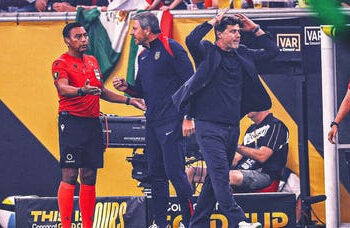The 2002 FIFA World Cup quarterfinal between the United States Men’s National Team (USMNT) and Germany is remembered by American soccer fans not just for the result, but for what could have been. The match, played on June 21, 2002, in Ulsan, South Korea, ended 1-0 in favor of Germany. Yet, the biggest controversy came in the 50th minute when a clear handball by German defender Torsten Frings on the goal line went unpunished. Had the US been awarded a penalty—and possibly seen Frings sent off—the course of American soccer history might have changed forever.
Let’s dive into the alternative timeline. What if the referee had made the call?
The Handball That Wasn’t
Gregg Berhalter, then a defender for the US, saw his shot on goal deflected off German keeper Oliver Kahn and ricochet toward the net. Torsten Frings, stationed on the goal line, had his arm extended. The ball struck it, preventing what was nearly a certain equalizer. In today’s game, with VAR, it would have been a clear penalty and likely a red card. But in 2002, the referee deemed it accidental. No penalty. No red card. No goal.
Sliding Doors Moment
In the alternate universe where the handball is called, several key changes unfold. First, the US is awarded a penalty kick. Landon Donovan or Claudio Reyna likely steps up. Given Donovan’s composure and precision at the time, there’s a good chance the US levels the score at 1-1. More importantly, Germany would have gone down to 10 men with nearly 40 minutes left to play.
With a numerical advantage and momentum on their side, Bruce Arena’s squad, already playing confidently and creating chances, could have seized control. The match might have tilted heavily in the USMNT’s favor, possibly ending in a 2-1 or 3-1 victory. That would mean a historic semifinal appearance—their first since the inaugural World Cup in 1930.
USMNT in the Semifinal – And Beyond?
A US win would have set up a semifinal against co-host South Korea, who had stunned Italy and Spain on their way to the final four. That matchup, while difficult, would have been far less intimidating than facing Brazil, Germany, or England.
Against South Korea, the US had already played in the group stage and earned a 1-1 draw. With added belief, and the taste of revenge for previous disappointments, the US could realistically have reached the final. In that scenario, a final against Brazil—featuring the likes of Ronaldo, Ronaldinho, and Rivaldo—would have been an immense challenge. But even reaching that stage would have been transformative for American soccer.
Impact on the American Soccer Landscape
Had the USMNT reached the 2002 World Cup Final—or even just the semifinals—the impact back home would have been seismic. Soccer, still seen at the time as a fringe sport compared to football, basketball, and baseball, might have received a much-needed cultural boost. Youth soccer participation was already high, but a deep World Cup run would have translated to increased investment, media attention, and possibly a faster maturation of Major League Soccer (MLS), which was still a fledgling league.
Players like Landon Donovan and DaMarcus Beasley would have returned as household names. Youngsters across the country might have looked at soccer not just as a pastime but as a legitimate path to stardom. Sponsors and television networks would have accelerated their commitment to the sport. And perhaps, the US would have avoided the lengthy rebuilding phases it faced in later years—most notably missing the 2018 World Cup.
International Respect and Legacy
On the global stage, such a performance would have reshaped perceptions. The US was seen as athletic but tactically naive. A semifinal or final appearance would have changed that narrative, earning respect from traditional powers and positioning the US as a team to watch in future tournaments. It might have also attracted higher-profile dual-nationals to commit to the US program earlier in their careers.
The careers of Bruce Arena and many players could have taken different trajectories. Arena might have been courted by European clubs. Players could have earned more prestigious club moves sooner. And the infamous 2006 group stage exit might have had a different tone with a stronger foundation laid in 2002.
The Ripple Effect
Soccer is a game of inches, and few moments illustrate that more vividly than Frings’ unpunished handball. One whistle, one decision, could have altered the arc of soccer in the United States. While the USMNT has made strides since then, it’s hard not to wonder what might have been had that penalty been awarded. Perhaps American soccer would have reached its “golden generation” much earlier—or perhaps expectations would have skyrocketed before the infrastructure was ready.
In any case, the 2002 quarterfinal remains a powerful reminder: history often hinges on a single moment. And in that moment, the USMNT was on
e call away from rewriting its story.











